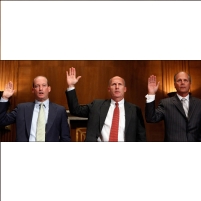Presidential Report Blasts BP and Others for Fatal, Cost-Saving Decisions
Friday, January 07, 2011
 BP, Transocean and Halliburton Officials Testify to Senate May 11, 2010 (photo: Tim Sloan, AFP)
BP, Transocean and Halliburton Officials Testify to Senate May 11, 2010 (photo: Tim Sloan, AFP)
There was no shortage of blame to go around, according to a presidential panel charged with investigating the Gulf of Mexico oil spill. The National Commission on the BP Deepwater Horizon Oil Spill and Offshore Drilling criticized everyone from oil giant BP to federal regulators for either causing the accident or mishandling the oil-spill response.
The commission’s final report, due to be made public on January 11, states that there are valuable lessons to learn from the worst-ever oil spill, if the country wants to avoid experiencing another one like it in the future.
“The blowout was not the product of a series of aberrational decisions made by rogue industry or government officials that could not have been anticipated or expected to occur again. Rather, the root causes are systemic and, absent significant reform in both industry practices and government policies, might well recur,” the report states.
According to Commission co-chair William K. Reilly, “do we have a single company, BP, that blundered with fatal consequences, or a more pervasive problem of a complacent industry? Given the documented failings of both Transocean and Halliburton, both of which serve the off shore industry in virtually every ocean, I reluctantly conclude we have a system-wide problem.”
Still, BP was faulted for seven of the nine time-saving (thus cost-reducing) decisions that the commission said increased the risk of an accident. The company should have done more to make sure efforts to cut costs did not compromise safety, the investigators concluded.
The commission also brought up the problem of how the government allowed BP to dominate the effort to stop the spill and mitigate its effects on the Gulf region. The U.S. Coast Guard, it was noted, often reported to a BP official, instead of orchestrating the response.
Furthermore, it made little sense, and represented a major conflict of interest, for the government to allow BP to maintain exclusive access over the gushing wellhead. “Given that its potential liability under the Clean Water Act depended directly on the flow rate, BP had real incentives to maintain exclusive control over the ability to estimate that rate.” This fact also played into another problem: the persistent low-balling of the oil spill rate, both by BP and federal officials.
-Noel Brinkerhoff
Commission Releases Chapter on BP Well Blowout Investigation in Advance of Full Report “A Failure of Management” “Cumulative Risk Large and Avoidable” Oil Spill Commission) (pdf)
Chapter Four: The Maconso Well and the Blowout (Oil Spill Commission) (pdf)
Scathing Report on BP Oil Disaster from Presidential Commission (by Brad Johnson, Grist)
White House Probe Blames BP, Industry in Gulf Blast (by Stephen Power and Ben Casselman, Wall Street Journal)
BP, Transocean, Halliburton Blamed by Presidential Gulf Oil Spill Commission (by Steven Mufson, Washington Post)
- Top Stories
- Unusual News
- Where is the Money Going?
- Controversies
- U.S. and the World
- Appointments and Resignations
- Latest News
- Trump to Stop Deportations If…
- Trump Denounces World Series
- What If China Invaded the United States?
- Donald Trump Has a Mental Health Problem and It Has a Name
- Trump Goes on Renaming Frenzy






Comments